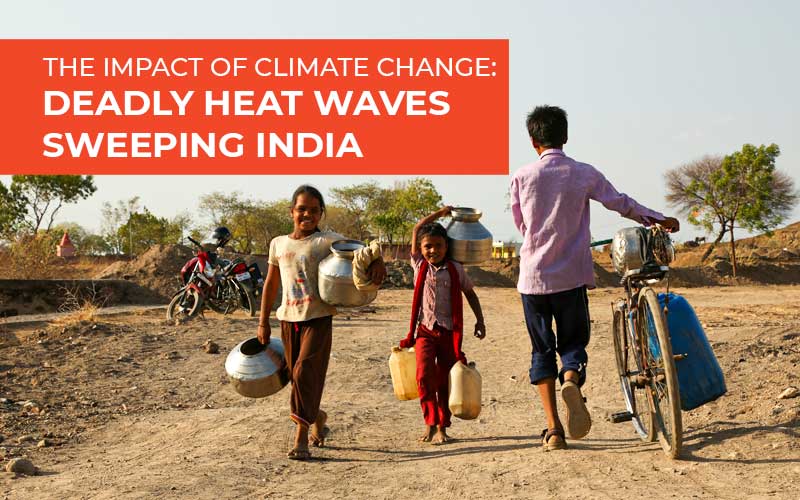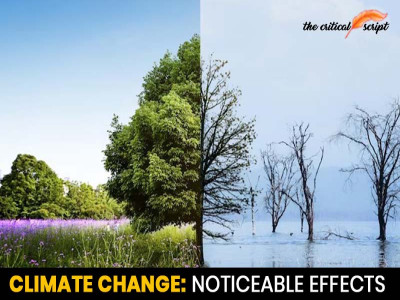
The Impact of Climate Change: Deadly Heat Waves Sweeping India
India is one of the most exposed and vulnerable countries to
heat. Hot days and hot night events have risen significantly, and are projected
to increase by 2050. Heat waves are also predicted to arrive earlier, stay
longer and become more frequent.
With rising temperatures and devastating heat waves becoming
more frequent, India finds itself at the forefront of a battle against the
adverse effects of global warming. The recent BBC report highlights
the severity of the situation and sheds light on the efforts being made to
mitigate the impact. In this article, we delve deeper into India's climate
change challenge, examining the causes, consequences, and initiatives being
undertaken to combat this pressing issue.
The Rising Temperatures:
India's climatic conditions have been changing at an alarming
rate in recent years. Extreme heat will oust 600 million Indians from their
climate niche, exposing them to extreme temperatures by 2030, reveals a new
research. India is the most vulnerable or at the ‘greatest future risk’
country. The United Nations Population Fund estimates India’s population to be
over 1.4 billion, which means climate vulnerability will affect almost half the
country’s residents.
The study shows that millions more people in India are
vulnerable to climate change than first thought. More than 90% of the country
could be severely impacted by heat waves, falling into an extreme heat “danger”
zone, according to the heat index.
Causes and Impact:
Several factors contribute to India's increasing temperatures
and the intensification of heat waves. One of the primary causes is the rising
concentration of greenhouse gases, mainly carbon dioxide, in the Earth's
atmosphere. The burning of fossil fuels, industrial activities, deforestation,
and agricultural practices are some of the human activities responsible for
these emissions. India's rapid urbanization and industrialization have further
exacerbated the problem, resulting in increased energy consumption and
environmental degradation.
The impact of rising temperatures and heat waves is
far-reaching. It affects not only human health but also agricultural
productivity, water resources, and the economy as a whole. Crop failures due to
extreme heat and changes in rainfall patterns have led to food insecurity and
economic losses for farmers. Additionally, heat-related illnesses and
heatstroke cases have surged, straining healthcare systems already grappling
with other challenges.
Mitigation and Adaptation Efforts:
Recognizing the urgent need to address climate change, India has
taken significant steps to mitigate its impact and adapt to the changing
climate. The country has set ambitious targets to reduce greenhouse gas
emissions and increase the share of renewable energy in its power mix. The
National Action Plan on Climate Change (NAPCC), launched in 2008, outlines key
strategies to combat climate change, including promoting sustainable
agriculture, enhancing energy efficiency, and improving forest management.
India's commitment to renewable energy has been commendable. The
country has made substantial progress in the deployment of solar and wind
power. The International Solar Alliance (ISA), launched by
India and France, aims to mobilize solar energy globally and accelerate the
transition to clean energy sources.
Furthermore, the government has implemented measures to increase
climate resilience and enhance adaptive capacity. Initiatives such as the
National Adaptation Fund for Climate Change (NAFCC) support vulnerable
communities in adapting to the changing climate by implementing innovative
solutions, building climate-resilient infrastructure, and strengthening early
warning systems.
Challenges and the Way Forward:
While India's efforts in combating climate change are laudable,
numerous challenges persist. The scale of the problem, coupled with the
country's population and socio-economic diversity, makes effective
implementation and monitoring of climate change policies a complex task.
Ensuring equitable access to clean energy, balancing economic growth with
sustainability, and promoting behavioral change among citizens are some of the
key challenges that need to be addressed.
To overcome these challenges, collaboration between government,
civil society, and the private sector is crucial. International partnerships
and knowledge sharing platforms can provide valuable insights and resources to
support India's climate change initiatives. Education and awareness campaigns
are vital to empower citizens and encourage sustainable practices at an
individual level.
India's battle against climate change and the adverse effects of
rising temperatures and heat waves is both urgent and complex. As the country
faces the realities of a changing climate, it is crucial to continue investing
in renewable energy, enhancing adaptive capacity, and formulating effective
policies. Through a multi-stakeholder approach and global collaboration, India
can strive towards a sustainable and resilient future, mitigating the impact of
climate change and ensuring a better quality of life for its citizens.
Disclaimer: The opinions expressed in this article are those of the author's. They do not purport to reflect the opinions or views of The Critical Script or its editor.

Newsletter!!!
Subscribe to our weekly Newsletter and stay tuned.

















Related Comments